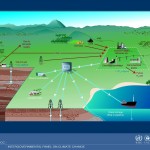 According to a new study, published by researchers from Chalmers University of Technology in Sweden in Environmental Research Letter, bioenergy with carbon capture and storage (BECCS) could reverse the global warming trend and push temperatures back below the global target of 2°C above pre-industrial levels.
According to a new study, published by researchers from Chalmers University of Technology in Sweden in Environmental Research Letter, bioenergy with carbon capture and storage (BECCS) could reverse the global warming trend and push temperatures back below the global target of 2°C above pre-industrial levels.
The combination of large-scale use of BECCS and the reduction of other emissions to near-zero using other renewable could reverse the warming trend and push temperatures back below the 2°C target by 2150. The results of the study show that if BECCS is implemented on a large-scale along with other renewable energy sources, temperature increases can be as low as 1.5°C by 2150.
BECCS is a greenhouse gas mitigation technology based on bioenergy that produces fuel for power plants or transportation while simultaneously removing carbon dioxide from the atmosphere.
When combined with carbon capture and storage — techniques that aim to pull carbon dioxide out of the flue gases from power plants and redirect it into geological storage locations — the overall carbon dioxide emissions are negative. If applied on a global scale, this could help to reverse global warming.
“The most policy relevant implication of our study is that even if current political gridlock causes global warming in excess of 2°C, we can reverse the temperature trend and reach targets later. This means that 2°C or even more ambitious targets can remain on the table in international climate negotiations” said Professor Azar, co-author of the study.
However, this statement should not be seen as an argument for delaying emission reductions in the near-term, “BECCS can only reverse global warming if we have net negative emissions from the entire global energy system. This means that all other CO2 emissions need to be reduced to nearly zero”.


